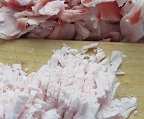

Fat: content limited to what we believe we need to know about fat in our daily life, based on our experience and readings.
Dietary fats are not just a source of energy; they function as structural building blocks of the body, carry fat-soluble vitamins, are involved in vital physiological processes in the body, and are indispensable for a number of important biological functions including growth and development. Last updated 13 February 2015 from EUFIC (The European Food Information Council, is a non-profit organisation, established in 1995.)
>> access EUFIC resource
Fat is not just for insulation and energy storage, it's also for nutrient absorption, cell signaling, immune function, and many other critical processes. Many people think the main difference between plant and animal fats is that animal-sourced foods contain more saturated fat, but here are a few fun, fatty facts that may surprise you:
Fat is not just for insulation and energy storage, it's also for nutrient absorption, cell signaling, immune function, and many other critical processes. Many people think the main difference between plant and animal fats is that animal-sourced foods contain more saturated fat, but here are a few fun, fatty facts that may surprise you:
- All whole plant and animal foods naturally contain a mixture of saturated and unsaturated fats.
- Some plant foods are higher in saturated fat than animal foods, with coconut oil topping the charts at 90 percent saturated fat. That's more than twice the saturated fat found in beef fat (tallow).
- The primary type of fat found in pork is a monounsaturated fatty acid (MUFA) called oleic acid, the same fat found in olive oil.
Below information from the CSIRO article: Should animal fats be back on the table? A critical review of the human health effects of animal fat. Published: 5 May 2014. >> access the CSIRO article
Abstract
Due to high levels of oleic acid, a low n-6 : n-3 fatty acid ratio in somegroups, and the presence of specific micronutrients including vitamins and essential fatty acids, animal fats are of benefit in human nutrition. Animal fats can be obtained in minimally processed form making them a convenient source of energy and micronutrients.
Introductory paragraphs
During human evolution, how much fat was eaten on a daily or yearly basis is a matter for speculation, and would depend on a host of factors. Given the nausea limit in human responses to large amounts of fat (Man and Gildea 1932), one suspects as much fat as could be stomached. [...] The degree of saturation of animal fat Although animal fats are described as saturated and containing cholesterol, apart from butter and some fatty fish, animal fat is best described as monounsaturated either by content or by function (Table 1) for its effect on serum cholesterol.
Last paragraph
Prominent medical professionals are starting to say that it is better to control sugar, especially fructose and thereby sucrose (Lustiget al.2012), and thatcontrolling dietary saturated fat is irrelevant, so it may be that the wheel has started to turn. Animal industries should be aware of these trends and need to take advantage of them when they arise,because changing selection goals or production practises does not occur overnight. More emphasis should be placed on healthy fat from animals, not just from fish, but also from livestock of allkinds.
Abstract
Due to high levels of oleic acid, a low n-6 : n-3 fatty acid ratio in somegroups, and the presence of specific micronutrients including vitamins and essential fatty acids, animal fats are of benefit in human nutrition. Animal fats can be obtained in minimally processed form making them a convenient source of energy and micronutrients.
Introductory paragraphs
During human evolution, how much fat was eaten on a daily or yearly basis is a matter for speculation, and would depend on a host of factors. Given the nausea limit in human responses to large amounts of fat (Man and Gildea 1932), one suspects as much fat as could be stomached. [...] The degree of saturation of animal fat Although animal fats are described as saturated and containing cholesterol, apart from butter and some fatty fish, animal fat is best described as monounsaturated either by content or by function (Table 1) for its effect on serum cholesterol.
Last paragraph
Prominent medical professionals are starting to say that it is better to control sugar, especially fructose and thereby sucrose (Lustiget al.2012), and thatcontrolling dietary saturated fat is irrelevant, so it may be that the wheel has started to turn. Animal industries should be aware of these trends and need to take advantage of them when they arise,because changing selection goals or production practises does not occur overnight. More emphasis should be placed on healthy fat from animals, not just from fish, but also from livestock of allkinds.
I do realise that one can find any answer one seeks with all the information at our fingertips. I chose however three sources from three different countries and perspectives. They all say - maybe what I want to hear - that animal fats are essential to the best functioning of the body.
So given that I have been feeling sick since 2012, have been tested for allergies (mild intolerance to wheat), for coeliac disease, have had ongoing blood tests for leukemia, anemia, neutrophilia, was down to 43kgs, and found a stable weight at around 47kgs, my diet had to change so I could eat and not be bloated and in pain. I was also diagnosed with I(rritable) B(owel) S(yndrome). I have skin rashes on my legs which come and go and seem to be related to levels of stress (self-imposed, that is! and I do believe that, no pun here). Blood Pressure is fine, I can exercise (30mns walk, 3 hours slow bicycle riding at merely 18kms/hr). I used to eat and still be hungry. I would wake up in the middle of the night craving for ??? I have resolved the sugar issue >> access the section on Sugar
So what ?
Well I got into a habit after my Sunday bike ride to fry pan a pork loin chop, add a bit of greens. And I always seem to satisfy my hunger.
I come from France where we eat a lot of animal fats in the form of dry sausages, pates, ham, and we cook casseroles in duck fat, goose fat. Funnily enough we do not eat big quantities of meat. My aunty also makes these beautifully rich macaroons out of pig fat.
So what ?
Well, in 2020, after more blood tests, and still craving, I tried the animal fat again and so far the cravings seem to have gone. As I write this, it is still early days but considering my readings, what my body is telling me, and what my French cooking background is showing me with a very low rate of heart disease despite their diet, it is worth re-introducing animal fat. I am not going to shy away from the fat coming from the animal but I will back off from butter because it is a form of processed fat which I am reacting to - for whatever reason, whether lactose or other issue. My body does not like it.
So given that I have been feeling sick since 2012, have been tested for allergies (mild intolerance to wheat), for coeliac disease, have had ongoing blood tests for leukemia, anemia, neutrophilia, was down to 43kgs, and found a stable weight at around 47kgs, my diet had to change so I could eat and not be bloated and in pain. I was also diagnosed with I(rritable) B(owel) S(yndrome). I have skin rashes on my legs which come and go and seem to be related to levels of stress (self-imposed, that is! and I do believe that, no pun here). Blood Pressure is fine, I can exercise (30mns walk, 3 hours slow bicycle riding at merely 18kms/hr). I used to eat and still be hungry. I would wake up in the middle of the night craving for ??? I have resolved the sugar issue >> access the section on Sugar
So what ?
Well I got into a habit after my Sunday bike ride to fry pan a pork loin chop, add a bit of greens. And I always seem to satisfy my hunger.
I come from France where we eat a lot of animal fats in the form of dry sausages, pates, ham, and we cook casseroles in duck fat, goose fat. Funnily enough we do not eat big quantities of meat. My aunty also makes these beautifully rich macaroons out of pig fat.
So what ?
Well, in 2020, after more blood tests, and still craving, I tried the animal fat again and so far the cravings seem to have gone. As I write this, it is still early days but considering my readings, what my body is telling me, and what my French cooking background is showing me with a very low rate of heart disease despite their diet, it is worth re-introducing animal fat. I am not going to shy away from the fat coming from the animal but I will back off from butter because it is a form of processed fat which I am reacting to - for whatever reason, whether lactose or other issue. My body does not like it.